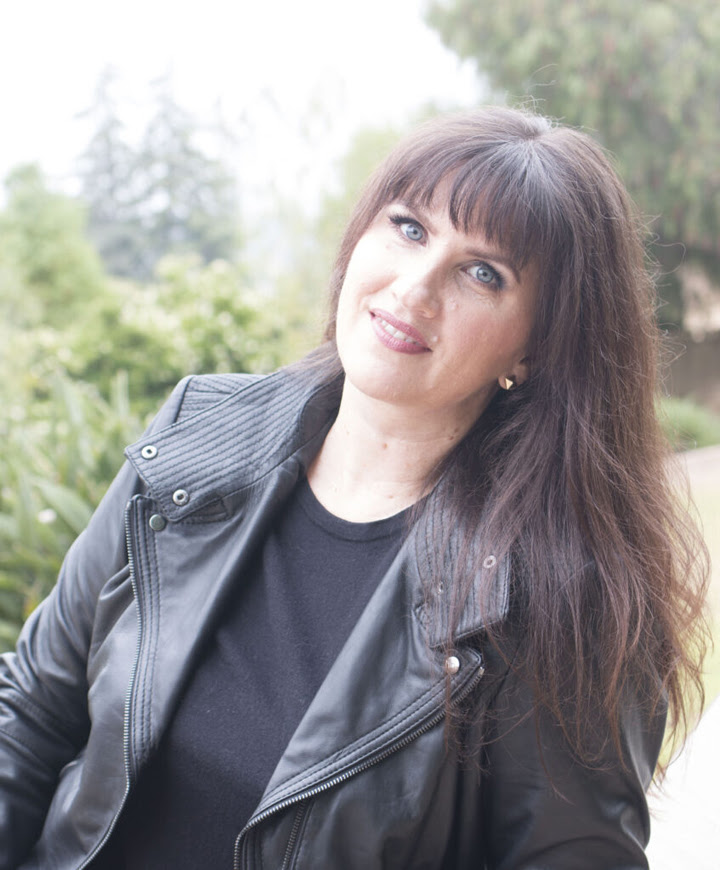
Meet Memoir Writer Leslie Ferguson:
As a child, all Leslie really wanted was a normal family and a mother’s love. Instead, she found herself trying to navigate a terrifying world with a schizophrenic mother, who tried to kill her. Hungry, afraid, and intermittently homeless, Leslie knew she had to leave to survive. But foster care tore Leslie away from her brother, and would embroil her in a worse life than the one she’d just left.
Then, in a sudden stroke of luck, Leslie met a special teacher. One who showed her that unconditional love and a new life both were possible.
Leslie went on to earn Master’s degrees in both English Lit and creative writing. Today, she is dedicated to promoting journaling as a healing tool. And her own hopeful, healing memoir, When I Was Her Daughter, is due out from hybrid publisher Acorn Publishing later this year.
We caught up with Leslie to ask what memoir tips she can share. Here are her powerful and poignant thoughts!
* * * * * * *

Q&A With Leslie:
Q: Your memoir has been over fifteen years in the making. What made you decide to start writing a memoir in the very first place? How did you begin?
A: I started writing poetry and short stories in college that weren’t directly about my childhood. Instead they contained abstract representations of the loneliness and grief I had repressed for too long. Little by little, I shared my story with therapists and close friends, and time and again, people said I should write a book.
In grad school in 2001, I began writing scenes that were closer to home. It was a safe way to explore some of the difficult memories from life with my biological mom. Slowly, these scenes became first-person accounts of events and emotions that are now part of my completed memoir.
Q: Stops and starts are hard but sometimes necessary when work or other things get in the way. What helped you to get going again, after a hiatus?
A: I have taken many breaks from the book due to time constraints, denial, and uncertainty about how to craft my scenes into an effective, meaningful book. Along the way, the story haunted me. I could never forget that I wanted to tell this story—that it needed to be told. So I kept coming back to it. I became committed to finishing the memoir and to making it as good as possible.
Sometimes, after a tough critique session, I would get discouraged. But eventually, my brain would work problems out, often while I slept or while I walked or showered. Any time I took to be alone with my thoughts, the memoir tried to write itself in my head.
Q: Things you’ve found helpful have included critique groups, beta readers, editors, and feedback from other memoir writers. How did you reach out to find those things? Do you have any advice for other memoir writers about the search (what works and what doesn’t)?
A: For memoir writers, especially, it is crucial to be open to hearing feedback. Memoirists tend to hold their stories very close to their hearts. But the only way to become a better writer is to detach from it enough to see it with the eyes of a writer and an editor, and to remove oneself from the pain of the trauma.
Early on, I got most of my feedback from classmates in my graduate writing classes. Then for a while I wrote and revised on my own. In 2012, I decided to get more serious about asking for feedback. I searched online and found a read-and-critique meetup group, and we met once a week for the better part of a year before people’s life circumstances changed and the group disbanded. I’ve also been a member of Scribophile, and I’ve met other writers at conferences, and even in my yoga class.
But scene-by-scene and chapter-by-chapter critiques can be extremely time-consuming, and often the feedback isn’t appropriate for book-length works. In the future, I plan to get a full first draft finished before I open its scenes up to readers. Otherwise, every book I write may take a decade to finish. That’s not fun, nor is it sustainable for serious writers. We must move faster than that. At some point, we must write more than we can submit to these groups.
I recommend finding beta readers who can read a book in less than a month, providing feedback about characters, story arc, and theme as well as any inconsistencies or problems they see. The next step, after revising, is to hire an excellent editor who can spot problems and clean up the manuscript for grammar, flow, and consistency.
Q: When we first connected you had a complete draft of your memoir done and were working on submissions to agents and small presses, with a goal of self-publishing if you didn’t find a good match. I understand you’ve now decided to publish through a hybrid publisher. Do you have any advice to other memoir writers based on your submission experience?
A: My best advice is to take the time to research and understand the publishing options that are available. Memoir can be a particularly tough sell to agents and publishers, mainly because the market is saturated. And without some education about how to craft stories and what makes a memoir a memoir, many writers’ stories fall short of true publishable quality. I see memoir after memoir that is more of an autobiography than a memoir. And the hard truth is that most people are not interested in reading about the mundane lives of ordinary people from birth to age fifty, or wherever the writer is in their life.
Crafting stories and presenting them in a compelling way takes time and some talent. Memoir must read like fiction, and it must contain themes, character motivation and change, and narrative arc. I wish more people who consider themselves memoirists would take the time to focus their story on a particular time in their life or on a few important themes.
Q: One of THE hardest things for most memoir writers is finding a way to deal with the trauma they’ve had in their lives that inevitably comes up as they start to write. And you’ve experienced much more trauma than most! What advice do you have to others about forging through those painful parts in their writing?
A: I’ve heard many memoir writers talk about how they want to avoid the most traumatic parts of their past. Those writers may not be ready, emotionally, to write a memoir. They can draft scenes and make outlines. But until they do the deep healing that is necessary to detach from their past enough to see it as a learning opportunity and a story that can potentially help others, they may have more work to do on themselves.
Simply telling the story of what happened is not enough. Until the writer changes and grows, they will have a difficult time seeing their story the way readers see it, and they may always balk at suggestions for how the writing could be improved, believing stubbornly that their story is already great. This is a dangerous place to be because this kind of writer will independently publish a book before it’s ready. Very likely, it will be a book full of errors and mundane events.
I believe the first draft and first two or three rounds of harsh critique are for catharsis. After that, when the memoirist can say they are in a place of acceptance, the story stands a chance to be great and impactful to readers. When I stopped being angry and bitter, and when I could tell my story out loud without shaking or crying, I knew I was ready to dig deeper. And I bet some readers may still say I haven’t dug deep enough.
A memoirist needs to be able to navigate their past trauma with a strength that inspires others and helps them make meaning out of their own traumatic experiences. I recommend therapy, journaling, poetry, and other positive outlets for processing everything traumatic they experienced. What works is different for everyone.
Q: Tell me a little about your platform-building efforts and experience. Has it been tough to set up? Time-consuming? Any helpful suggestions?
A: Platform-building can easily become a full-time job. I am still trying to figure it out. I have Instagram, Twitter, and Facebook accounts. I am setting up an author website and creating a newsletter. And, because of my own frustrations during the process, I am writing a blog post about how to navigate these confusing waters and the steps an author can take to start building a platform.
I am still a bit mystified about how best to interact with followers who are truly enthusiastic about my memoir and my social media content. I’ve learned a lot, but I have a long way to go to align my “brand” and “platform.” After some trial and error, I’ve realized I am most comfortable speaking about how trauma impacts us and how we can become our own advocates in our healing journey. I am interested in helping people live calmer, more balanced, purposeful lives.
Q: Is there any other advice you’d like to share, based on your memoir writing journey?
A: My memoir writing journey has been rewarding as well as emotional. There is a kind of satisfaction that comes from conquering your demons and regaining control over your life. When I look back at how far I’ve come, I feel proud of myself and grateful to everyone who has guided me along the way.
My best advice: Don’t give up! Write that memoir, and continue seeking ways to become the best version of yourself so you can say (and believe) that your trauma has shaped who you’ve become. Surviving trauma provides a unique opportunity to become more compassionate and empowered. When we process adversity and choose to learn from it, we become stronger and more enabled to see all the beauty that comes our way.
______________

Connect with Leslie here:
Website: LeslieFergusonAuthor.com
Instagram: @MoreLeslieF
Twitter: OLeslie Ferguson
_______________
Like more memoir tips? Check out our book (affiliate link) on Amazon!

